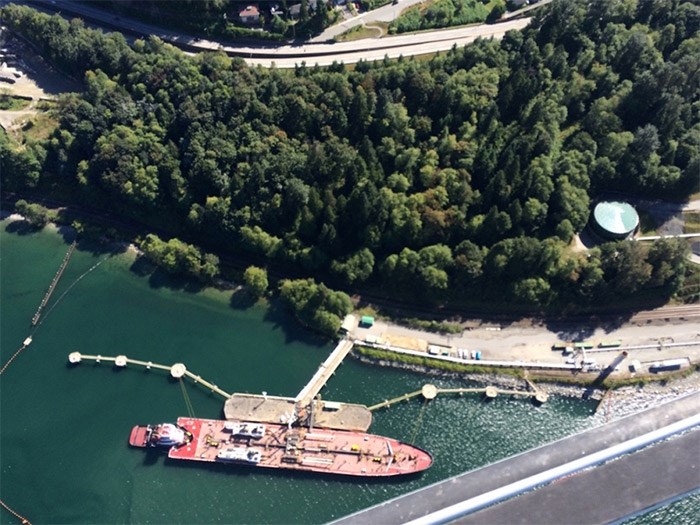 A tanker fills up at the Kinder Morgan Westridge Marine Terminal on the Burrard Inlet. File photo
A tanker fills up at the Kinder Morgan Westridge Marine Terminal on the Burrard Inlet. File photo
A nearby resident is raising concerns pile driving at Kinder Morgan’s Westridge Marine Terminal is causing tremors that are affecting homes in the area.
Work began in September 2017 in preparation for the company’s planned Trans Mountain pipeline expansion, which is expected to triple the route’s capacity to carry oil from Alberta to be shipped by tanker overseas. Construction involves pile driving for additional support structures for the facility.
Aaron Keogh said he awoke to the noise and vibration from the pile driving last Saturday morning in his residence on Braeside Drive, about 700 metres up the hill from the terminal.
“You could literally feel it through the bed and obviously through the walls. You put your ear or your hand up to the wall, and literally you can feel it,” said Keogh. “The further concern from that is what effect will weeks of ongoing activity like that, because you don’t know how long it’s going to on for, have on the structures, basically the houses and such, surrounding the area?”
Keogh pointed out there are many homes on the north side of Inlet that are much closer and more vulnerable. He said he didn’t get a satisfactory answer when he contacted Trans Mountain.
“They did not wish to give me any assurances that they were willing to stop until such time as they could determine it was not going to affect houses,” said Keogh, who also called the Vancouver Port Authority and was told his complaint would be followed up.
Keogh said he was not aware of any notification the pile driving was coming. The pipeline opponent feels the tremors are a harbinger of what’s to come and worries about the damage the construction could cause in Burnaby.
“There is more than a billion dollars worth of homes, houses and apartments and other structures, plus an irreplaceable forest and parkland that, should it basically be spilt, burned, etc., it’s anywhere from extremely costly to irreplaceable. It only takes so long for it to be gone,” said Keogh. “You really don’t know what you have until it’s gone.”
Trans Mountain, in an email to the NOW, said pile driving at the terminal started at the end of September 2017, after it submitted a noise management plan to the National Energy Board. It calls for all construction activities to be monitored to make sure the noise levels for residences within 300 metres doesn’t exceed Health Canada and B.C. Oil and Gas Commission noise guidelines and for Trans Mountain to file weekly reports from its 24/7 receptor monitors with the port authority.
“To date, Trans Mountain’s noise monitoring indicates that pile driving activities at Westridge have not exceeded such guidelines,” said a Trans Mountain spokesperson in the email.
To help reduce the noise from marine pile driving into the ocean floor, Trans Mountain is using a shroud over the impact hammer, “which dampens the sound of the impact by 65 to 95 per cent.” According to Trans Mountain, it’s the first time a shroud has been deployed for a piling project in Vancouver’s port.
Trans Mountain is also looking at using a sound wall to mitigate noise in future projects at Westridge such as construction of the tunnel portal. The company is also looking at using a sound wall to mitigate noise in future projects at Westridge such as construction of the tunnel portal.
According to a schedule filed with the NEB, pile driving will be conducted on and off for various projects at the Westridge terminal until late 2020. Pile driving and construction activity is limited to between 7 a.m. and 8 p.m. on weekdays, 9 a.m. to 8 p.m. on Saturdays. No work is planned for Sundays and statutory holidays. Any night shift work will not include using heavy equipment, according to the noise plan.
“The daytime average noise levels near residential properties are expected to range between 57 and 64 (decibels). Some short-term activities will be louder than the average,” said the Trans Mountain plan. “As a comparison, a household refrigerator generates about 55 dBA and an ordinary conversation in an office at a one-metre distance generates about 60 to 65 dBA.”
Elsie Dean, a spokeswoman for Burnaby Residents Opposed to Kinder Morgan Expansion, said the group’s members protesting the pipeline daily at the terminal have not noticed a lot of noise from the construction.


